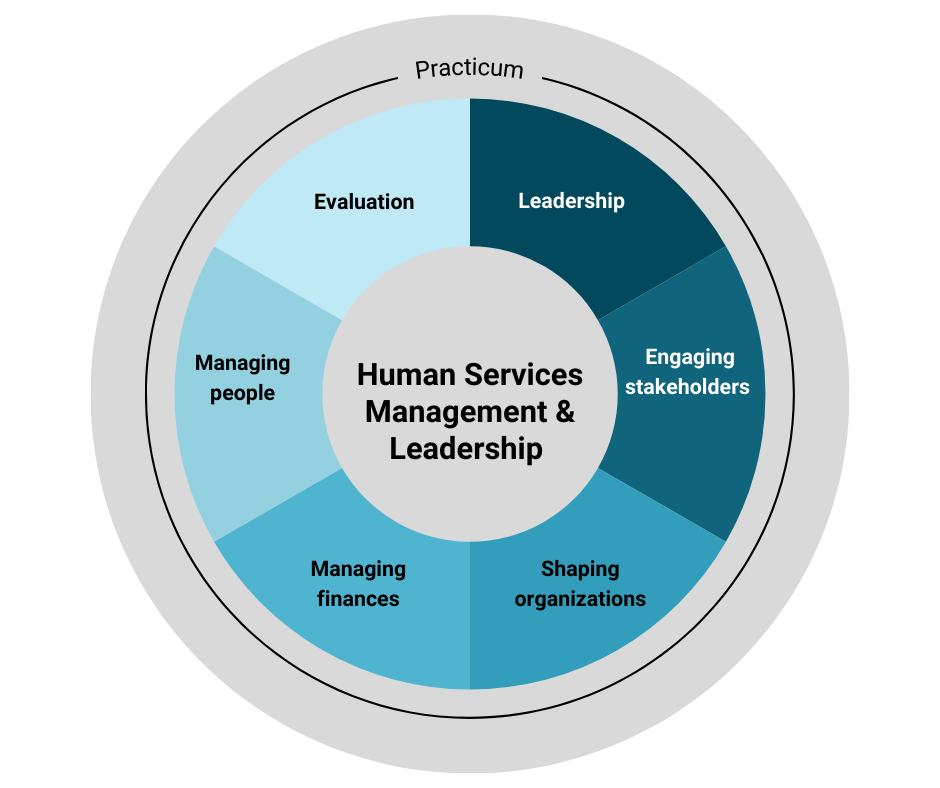Human services management and leadership field of study
 A rapidly changing society requires social workers who can serve people on the ground in human service organizations in the nonprofit, for-profit and public sector. We need leaders who can shape and direct these organizations to create and manage innovative programming that is based on the lived experiences of social service user groups.
A rapidly changing society requires social workers who can serve people on the ground in human service organizations in the nonprofit, for-profit and public sector. We need leaders who can shape and direct these organizations to create and manage innovative programming that is based on the lived experiences of social service user groups.
The human services management and leadership field of study provides Master of Social Work students with a rigorous, comprehensive grounding in the key values, skills and knowledge required by human service leaders and managers to create and implement programming that is anti-oppressive, innovative, and client-centered, with a focus on equity and inclusion.
In this field of study you will:
- develop skills in leadership, nonprofit governance, social innovation and social entrepreneurship, partnership development and strategic planning
- gain an understanding of financial management, including social financing, social enterprise development, accounting, budgeting and forecasting
- develop knowledge and skills in human resource management and labour relations
- learn to manage service delivery including such areas as developing organizational structures, annual planning, program development and evaluation and selecting and maintaining management information systems.
Coordinator
Human services management and leadership competences

Learn about the competencies students will acquire in the Human services management and leadership field of study, and the skills, courses and assessment indicators or methods associated with each.
Required courses
- SWK4425H Human Services Management and Leadership
- SWK4426H Financial Management and Leadership in Human Service Organizations
- SWK4427H Human Resource Management in Human Service Organizations
- SWK4515H Research and Quality Improvement in Human Service Organizations
- SWK4702Y Social Work Practicum II
- Two half-credit graduate level electives
MSW Program with Advanced Standing complete the above courses plus the compulsory course SWK4510H Research for Evidence-Based Social Work Practice. SWK4510H must be completed before taking any of the research courses in this field of study. Students take this course in the first terms of the MSW Program.
Related elective examples
SWK4646H Special Topics in Human Services Management and Leadership II: Clinical Leadership, Supervision and Staff Development
SWK4649H Social Innovation and Social Entrepreneurship in the Human Services (Note: This is a 5 day intensive course offered in June. Those in the one-year advanced standing program may take the course in the June before the required courses start in September)
The above courses are examples of electives related to HSML. Electives offered depend on instructor availability.
Practicum examples
The following organizations offer practicum opportunities most years, but not every year, depending on availability.
Organizations:
- Access Alliance Multicultural Health and Community Services
- Alzheimer Society of Ontario
- BOOST for Kids, Social Work Administration
- Canadian Centre for the Victims of Torture
- Centre for Addiction and Mental Health
- Child Development Institute
- Children’s Aid Society City of Toronto
- Anthony Perruzza’s Office
- Family Service Toronto
- Holland Bloorview
- JACS – Jewish Addiction Community Service
- LOFT Ministry of Attorney General-Supervised Access Program
- Ministry of Community and Social Services, Ontario Works
Career prospects
The goal of the Human Services Management and Leadership field of study is to train the next generation of leaders in the human services sector, broadly defined. The trajectory of graduates will depend in part on their previous work experience, skills and stage.
While graduates with less experience may work as research director, project administrator, supervisor, consultant, manager, campaigner, team leader, grant writer, policy analyst, or fundraiser, it is expected they will continue to develop management skills and advance to more senior positions, including Executive Director, CEO, CFO, board member, and senior manager of existing service delivery nonprofits, or to start organizations of their own to better address persistent and emerging social needs. Many students will work in the non-profit sector, while others will work in public (health/education/social welfare), academic or the private sector, or move between sectors.
What competencies can I expect to gain from this field of study?
Students in Human Services and Management can expect to gain the skills, values, and knowledge required to assume the role of supervisors, managers, executive leaders, and administrators in the notfor-profit sector. The not-for-profit sector is primarily responsible for the delivery of social services in Canada. The program was collaboratively created and is jointly taught by community leaders who aid in developing student’s capability to manage social service agencies. Specifically, students will gain competencies in human services leadership, navigating financial and service delivery systems, engaging effectively in partnerships within the nonprofit sector and across sectors with for-profit and government organizations, strategic planning, financial and human resources management, and assessing social outcomes and social impact through program evaluation. Special topic electives aid in developing competencies that will aid learners in how to create organizational change and promote organizational development, along with engaging in socially innovative efforts, creating social enterprises, and embarking on other social entrepreneurial efforts.


